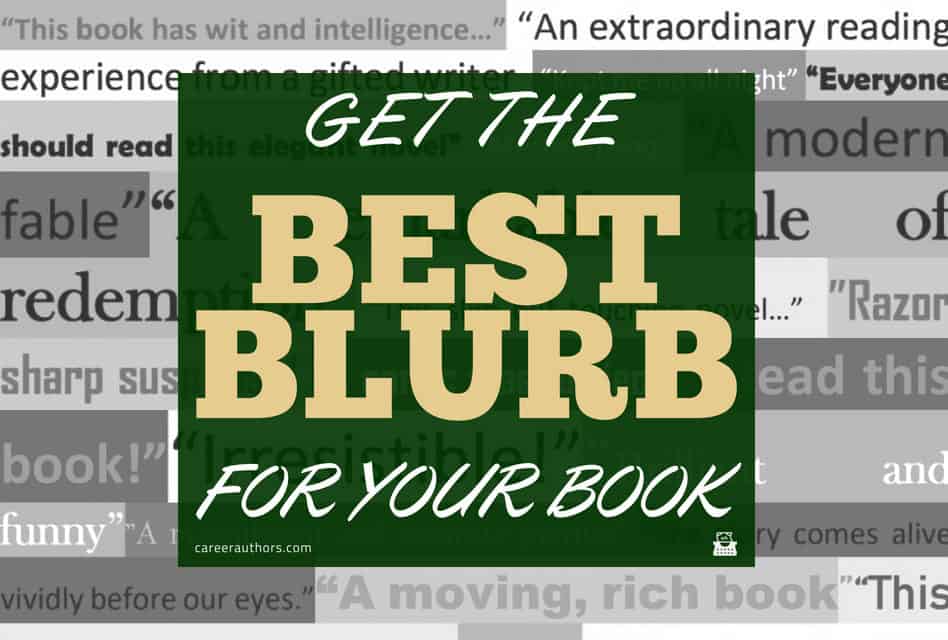A blurb is a short description of a book used for promotional purposes but this blobby word is often shorthand for a book endorsement from another author.
New writers might think blurbs come from interested, well-wishing, famous authors who have gotten their hands on a book early and who are rushing in to exclaim that Eureka, a new star is born! That happens, I suppose. However, more commonly, career authors and publishers are working hard early on to get quotes from specific writers.
The newer the author, the greater the effort might be to acquire endorsements. In lieu of an established reputation, a blurb may provide booksellers and readers with more of a sense that they will really enjoy the book. It’s attention-getting.
The power of connections
Chances for success are greatly improved if a career author receives a blurb request from someone they know. If you have one, a literary agent might be enlisted to comb through their client list for the right candidates to say a nice word or two about your work. Certainly, your agent has a vested interest in making your book a hit.
Take aim
Wildly off-base endorsements are fairly common. Sure, your cousin may be a famous Denver Bronco, a news anchor or a philosophy PhD, but that doesn’t mean their illustrious name on your novel’s cover translates into sales. Nor is just being another writer enough of a qualification. A blurb-seeker needs good aim, and should focus on career authors with a similar target readership. Susan Mallery would be a fantastic endorser for a romance. Margaret Atwood’s name packs more of a punch when endorsing a literary novel. Stephen Coonts’ name brings more value to a thriller.
Certainly, all blurb writers are not bestselling authors but their readership and brand should be similar to yours.
Go generic
The best quotes are generic. “A great book and an astonishing debut” sounds terrific but that quote can only be used on one book. “An accomplished writer who delights readers like no one else”—that’s a quote with legs! It can be used on successive books.
Hardworking blurbs
Like the author, a publisher craves an enthusiastic blurb to attract new readers. While employed at various houses, I spent many hours writing flattering requests for various writers to blurb another’s project. It can get more complicated than that: often at publishing houses, editors hit up other editors to weasel a quote out of one of their authors.
A good blurb also does fantastic work in-house. Support branches of a publishing company can use it to increase visibility among booksellers. The book’s publicist can use it in social media campaigns, and they now have something besides the plot to pique interest in the press release going out to reviewers and media. The subsidiary rights department has more convincing evidence that foreign publishers should take on this author or book.
Blurbs that match your brand
Writers possibly providing blurbs must also determine if they’re praising the right book for their readers. If an author has made a career out of writing quaint cozy mysteries, they may hesitate to endorse a saucy, erotic novel. Their loyal readers could be upset when coming across explicit material, and no author wants to lead their audience astray. Just like writers requesting a blurb, blurb-giving authors must determine if an endorsement fits their brand. Further, some blurbers hesitate at doling out too many endorsements, fearing this may dilute the value of their praise.
Nothing to say
And then there is the dilemma for a writer who doesn’t wish to endorse. Writers may claim a scheduling conflict—a good excuse that might also be true. Established career authors have their own book deadlines and promotional efforts to handle. One famous author made it simple: if the writer requesting a blurb from her didn’t hear back, a quote was not forthcoming. She didn’t want to embarrass either of them by giving the reasons she didn’t want to endorse the book. A writer who doesn’t like your book may sometimes be honest and tell you why. Such a critique could be helpful and appreciated or it could be unwelcome, which is why white lies are so common.
Go team!
Getting the ideal endorsement requires tact and perseverance. Blurbs praising your book may be acquired a number of ways, and it’s often a team effort. Maybe in person or by email you are bold in your requests to writers while introducing yourself (“I’ve long been a huge fan of your work…”). Paula’s Elevator Pitch formula will help you present your book succinctly. Attending writers conferences, local gatherings or readings are ways to meet other authors. Networking comes easier for some writers than others, but when seeking a blurb connections come in extremely handy, as does a compelling sales pitch. What if you got in an elevator with Stephen King today? Is your pitch ready?





